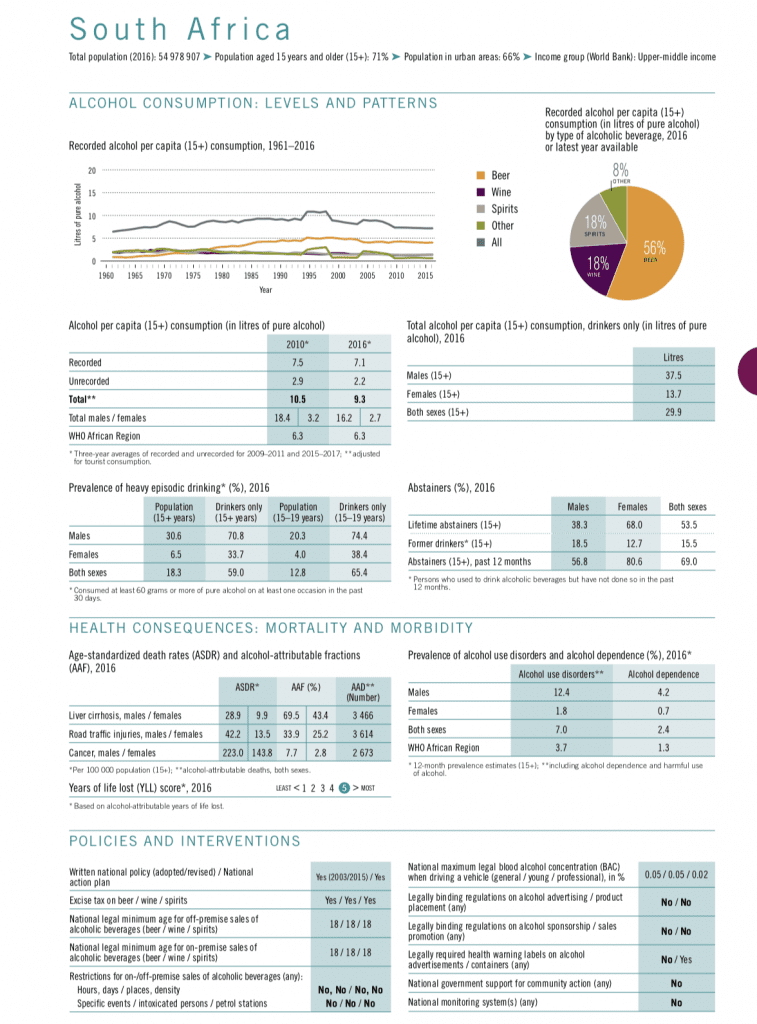The products and practices of the alcohol cause harm to people and communities on a large scale around the world. The World Health Organization estimates that every ten seconds a human being dies due to alcohol. Many of these deaths could be prevents if people were better protected from alcohol companies and their unethical business practices pushing harmful products.
While most of the people who die due to alcohol or who fall victim to Big Alcohol’s greed in other ways do not receive attention in the media, some do and their stories help illustrate the harmful practices of the alcohol industry more clearly.
Aggressive alcohol industry practices pushing alcohol on people
An alcohol competition in South Africa has cost a man his life. The man died after consuming an entire bottle of Jagermeister to try and win $12 in a competition arranged by a liquor store.
A liquor store in Limpopo’s Mashamba village in South Africa conducted a fatal alcohol “competition”. The prize was about $12 for anyone who finished an entire bottle of Jagermeister – a German high-strength alcohol product with an alcohol by volume of 35% – during a certain time frame. This highly unethical “challenge” cost a young man his life. He died after consuming an entire bottle of Jagermeister in two minutes.
Such alcohol “challenges” that promote binge alcohol use are dangerous and highly unethical, as evident from the recent tragic incident. They are also common and appear part of the strategy of the alcohol industry to push their products on people.
In the second fatal story, the nightclub incident, 21 young people died due to alcohol. But it is still unclear what exactly led to the deaths of 21 young South Africans.
The Enyobeni nightclub had been reportedly entrance free that night on June 26, and many underage teens had gone to the club to celebrate the end of mid-terms. According to teens who survived the incident, alcohol was being served for free leading to heavy binge use by the young people.
Free alcohol, no legal age controls to enter the location – two more tactics the alcohol industry uses to drive binge alcohol consumption among the youngest.
South Africa currently has an 18-year minimum legal age for alcohol use. Clearly the nightclub was doing illegal business. So far the owner of the nightclub and two others have been arrested in connection with the incident. The owner is set to appear in court on August 19, 2022.
Toxicology reports have revealed that Methanol was detected in the bodies of the 21 dead teens. Methanol is used industrially as a solvent, pesticide, or alternative source of fuel. It is not used in the production of alcohol sold for human consumption. So far alcohol poisoning and carbon monoxide poisoning have been ruled out even though both were found in the dead bodies.
There is no safe level for alcohol use, according to scientific evidence. And binge alcohol use is especially harmful not only for the person using alcohol but for others around them. The negative effects of binge alcohol use on the alcohol user include intoxication, cardiovascular diseases, dependence, and neurocognitive and developmental disorders, among others. The harm binge alcohol use causes others include accidents, violence, and harmful effects on fetal and perinatal neuronal development. These effects can be acute or chronic, even among those who binge on alcohol sporadically.
Room for alcohol policy improvement in South Africa
According to the World Health Organization (WHO) already South Africa has a per capita alcohol consumption that is higher than the WHO African region at 9.3 liters.
Binge alcohol is high in the country, specifically among men. Over two-thirds (70.8%) of men above 15 years who consume alcohol and almost three-quarters (74.4%) of young boys between 15 to 19 years of age who consume alcohol engage in binge alcohol use.
The shocking alcohol deaths that have received bigger public and media attention illustrate not only the alcohol industry’s unethical business practices. They also show the urgent need for South Africa to improve its alcohol policies.
For instance, common sense limits on the availability of alcohol and a ban of alcohol advertising and promotion are two alcohol policy solutions that people and communities would greatly benefit from. Putting common sense alcohol availability limits in place, such as outlawing alcohol sales promotions, ensures that people, especially youth, are protected from harmful practices such as alcohol competitions.
The success of the temporary alcohol sales bans during the COVID-19 pandemic has shown South African policymakers the potential of alcohol policy solutions in uplifting the lives of all South Africans.
The Liquor Amendment Bill of 2016 is a logic place to start to prioritize alcohol policy in South Africa and protect the South African people from the harms caused by the products and practices of the alcohol industry.
[This article was updated on August 3, 2022 as per new information from CBC]
Sources
The New York Post: “Man dead after downing entire Jagermeister bottle in two minutes: cops“
Mirror: “Man dies after downing an entire bottle of Jagermeister in under two minutes“
Daily Beast: “Bar Owner Arrested After 21 Young People Mysteriously Die in Nightclub“
CBC: “Methanol detected in all 21 teens who died at South African tavern“
